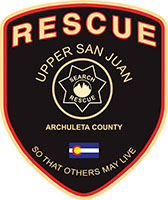As you guys may have noticed, the weather is getting colder and our last few missions have been on the chilly side. Now is a good time to insure that your personal gear is warm enough to withstand a night mission at 11,000 ft. It is crucial that we have the proper gear in the backcountry for ourselves to stay comfortable. It also important that we manage our equipment properly throughout a mission, things like layering properly and managing battery life can greatly increase our success on a mission.
So, make sure that you carry at the very least the ten essentials for backcountry travel. These ten are; navigation tools, headlamp, sun protection/weather protection, first aid, knife, fire starting material, shelter, food, water, proper clothing. It is important that each member has the basics in their own bag so that they may survive in the backcountry on their own. It is rare for member of SAR to be alone on a mission but we always want to be prepared. REI has a great article on the Ten Essentials on their website if you would like to learn more. https://www.rei.com/learn/expert-advice/ten-essentials.html
Now that we are heading into winter it is important for us to have the proper clothing in the backcountry. I am a huge fan of a layering system. I find it best to start with; a moisture-wicking next to skin layer (Voormi works great for a base layer), an insulation layer (I prefer down materials) and a hard-shell outer protective layer (I prefer GOR-TEX materials). To learn more about clothing layer systems, REI has another great article on the subject https://www.rei.com/blog/snowsports/how-to-dress-in-cold-weather.
How you manage this layer is crucial to how warm you will be. I always try to avoid sweating in cold weather if possible; sweat will drop body temperature drastically if held next to skin. So often I will start a cold mission with minimum layers (a base layer and maybe a shell), even if I am a bit chilled. I will then add layers if I start becoming cold while hiking or if I stop physical activity. Taking time to have the proper layer on at the start and during the mission will ultimately insure comfort throughout the mission.
As many of you know, we depend heavily on our handheld radios and our cell phones during an average mission. These items have a short battery life so it is very important to manage these batteries in the backcountry. In most situations, it is not necessary for everyone to have their radio on at the same time but it is important to save the radio batteries for later in the mission. So if you are in a team with multiple people it is good practice to turn all but one or two radios off. Cell phones are extremely useful for navigation but again not every person on the team needs to have their phones on. A good practice to save battery life, is to turn the phone off or into “airplane mode” if the phone is not needed. This can be done by only having one or two navigators at a time. Using the GPS on the phone will drain a phone battery quickly, so it is important that only the navigator uses GPS apps while on missions. Another thing to think about when it comes to cell phones is that the battery will drain power rapidly when cold. So place your phone in an inside pocket so that your body can keep it warm. I personally carry a portable battery charger in my SAR pack; I highly suggest them to anyone in the backcountry.
And one last tip for missions in colder weather is to manage your food and water correctly. I have found that even insulated bladder bags will freeze at the hose. So I prefer to switch to water bottles for my water supply in colder months. When it comes to food, I find that certain food like cliff bars will freeze and become nearly impossible to eat. So make sure that the food you choose to take with you will withstand freezing temperatures without become ice solid.
If you guys would like to learn more, REI’s website is great resource for article on almost anything outdoors. And if you have you have question or would like my opinion on something, please feel free to ask me.
Regards,
Wesley Laverty
Archuleta County Sheriff’s Office
Deputy of Emergency Operations
Email: wLaverty@archuletacounty.org


Komentar